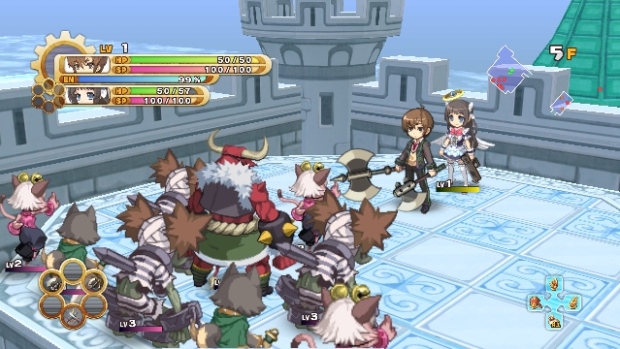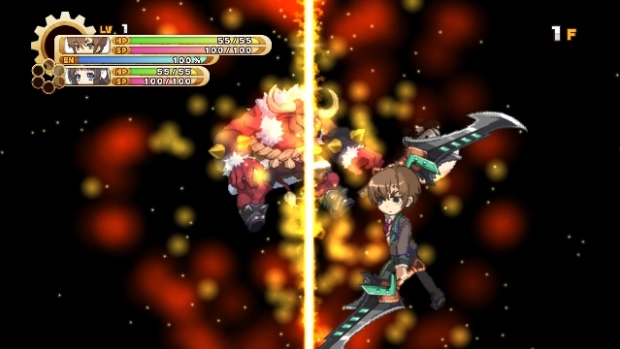The Guided Fate Paradox Review
How do you think God answers the wishes of us mere mortals? Divine intervention? Direct interaction? Stodgy dungeon crawling? If you answered C: stodgy dungeon crawling, then you’re thinking exactly the same thing as Nippon Ichi Software. The Guided Fate Paradox is a game about a school boy who becomes God and interacts with mortals through the medium of enemy squish-y labyrinth navigation.
Let’s flesh that out. Renya is a common schoolboy cursed with poor luck and a plain life. No girlfriend, average grades, few friends, Renya is the epitome of mediocre. This vanilla streak ends when, one day while visiting the mall, our hero wins a random sweepstake that sees him cast as God. G-O-D. The almighty. The big man. Renya goes from having no-one and no purpose, to being surrounded by adoring angels while a swath of mortals cry for his intervention.

Before you worry yourself, however, know that The Guided Fate Paradox isn’t even remotely preachy, or even too religiously reverent. Sure it has angels and devils, and talks about the role of these characters in relation to us common “mortals”, but it doesn’t take long for things to turn mysterious with talk of your character’s failure, a “true” purpose underlying the initial message, and your gaggle of Angel acquaintances being revealed as far less functional than originally advertised.
The narrative is, however, a touch on the pervy side. As previously alluded to our hero is a smidge vanilla. By that I mean that Renya is the typical anime schoolboy hero: he’s a bit of an introvert, he’s scared by the opposite gender, and when confronted with a quandary he’ll aim to appease anyone and everyone. A great chap to split a pizza with as you’ll likely get the bigger slices, but would you trust him with absolute power? Anyway, his new role of God sees him surrounded by females – some of which are unnervingly predatory – so he reacts with every variation of nervous whimper you’d expect, while the script sees the more “innocent” girls deliver the most painfully obvious innuendos completely plain-faced, forcing Renya into painfully embarrassing situations frequently.
These moments are fortunately “complemented” by The Guided Fate’s levels, which take the form of questions to you, God. Now, Bruce Almighty might not be one of the smartest films around, nor one of the most memorable, but it did nail one thing – God gets asked a lot of questions. Whereas that film dealt with them via the medium of mass email, The Guided Fate Paradox uses these questions, one at a time, to frame its core gameplay.

While that sounds boring the game avoids this by being utterly absurd. Ever heard of a fairy tale character being upset with the way their story ends? Well your first act as God in The Guided Fate Paradox is to help Cinderella change the end of her tale, and while the game’s handling of the beloved yarn and characters is, well, questionable, it’s still an interesting set-up. And that’s but the tip; you’ll then move on to help out a zombie who’s craving some brains, with the dialogue pondering the legitimacy of running zeds in the process.
It’s a silly game, then, and in many ways endearingly so if you can accept the occasional sexist dips in the script. What’s unfortunate is that the dungeon crawling feels largely disconnected from the storytelling.
The concept is that, as God, you can affect a “copy” of the real world to influence the “original” world. In the copy, we see the people that have wished for God’s intervention, but all direct interaction is done via cutscenes. In-between these story scenes, The Guided Fate Paradox becomes a dungeon crawler in which we fight baddies that represent the “real” world trying to fight against the potential change we’re enforcing. There’s no agency in the story telling, and dungeon scenes even look different to story scenes.

The dungeon crawling is fun, it just feels needlessly separated from the tale being told. Crawling is a case of moving around an isometric map, keeping tabs on energy, health and magic while engaging with foes in a rudimentary turn-based combat scheme. You can even lift and throw enemies and objects, similar to Disgaea D2. Failure isn’t a stopping point, thankfully, as you retain levels gained, but you do lose equipment and money so fainting is best avoided. When death does happen it’s often best to replay old levels to regain some tools and dough, so your main punishment for failure is a bit of a forced grind. The game isn’t repetition heavy if you’re good and prepare before entering Wishes, so after a few failures you’ll likely be far savvier and think about what you’re doing. It’s not Dark Souls, but The Guided Fate Paradox will come down on you, hard, if you start assuming everything is fine.
VERDICT: The Guided Fate Paradox is more of a Japanese visual comedy than it is a dungeon crawler, with gameplay taking a significant back-seat to long, rambling, plodding story scenes. The narrative is often entertaining, if a touch pervy, with the premise of playing God played purely and simply for laughs rather than holding any modicum of sincerity. This isn’t to say that the gameplay is bad, more that its mere presence appears to cause friction with the storytelling – it’s rarely given time to shine as the narrative butts in every two minutes.
The real Paradox, then, is what exactly this game wants to be: visual novel or hardcore dungeon crawler. What’s here is entertaining enough, no need to worry about that, but you’ll enjoy it more once you accept that you’ve got a slightly sleazy schizophrenic on your hands.

DECENT. A 6/10 indicates that, while this game could be much better, it still has a fair amount to offer the player. It might be an interesting title sabotaged by its own ambition, or a game denied greater praise by some questionable design choices. Don’t avoid it outright, but approach it with caution.





